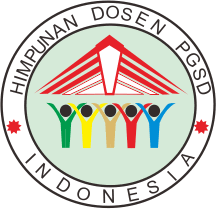Hubungan efikasi diri dengan kemampuan pemahaman konsep matematika materi pengukuran luas satuan baku dan tidak baku peserta didik kelas iv sd negeri sekecamatan pasarkliwon
Abstract
The ability to understand mathematical concepts is one of the important abilities in mathematics learning activities. In efforts to improve mathematical understanding, it can be influenced by self-efficacy. This study aims to determine the relationship between self-efficacy and the ability to understand mathematical concepts in elementary schools. The research method used is a quantitative correlational approach. The research sample consisted of 56 fourth-grade students from elementary schools in Pasarkliwon District. The sample was taken randomly using a cluster random sampling technique. The data analysis process used a simple Pearson Product Moment correlation hypothesis test. The results of the analysis showed a correlation coefficient value of 0.300. The correlation coefficient value of 0.300 indicates a low level of correlation. Based on the calculation of the coefficient of determination, self-efficacy contributed 9% to the ability to understand concepts. The results of the study prove that self-efficacy and the ability to understand concepts is positively and significant correlated.
Keywords
References
[1] N. L. Putri, V. Mettayana, Y. A. Rahmawati, and F. O. Nugroho 2021 Efektivitas Pembelajaran Daring (Online) Terhadap Hasil Belajar Siswa Pada Mata Pelajaran Tik Di Sd Anugrah Tanjungpandan, Prosiding Seminar Nasional Ilmu Pendidikan dan Multidisiplin 4(1) pp. 193–199
[2] A. P. Christidamayani and Y. D. Kristanto 2020 The Effects of Problem Posing Learning Model on Students’ Learning Achievement and Motivation Indonesian Journal on Learning and Advanced Education (IJOLAE). July pp. 100–108, doi: 10.23917/ijolae.v2i2.9981.
[3] R. Dewi, Suharno, and F. Purnama Adi 2019 Peningkatan pemahaman konsep membandingkan pecahan sederhana melalui model pembelajaran pair checks pada peserta didik kelas III sekolah dasar, Didaktika Dwija Indria 7(1) pp. 31-36
[4] A. P. Fajar, K. Kodirun, S. Suhar, and L. Arapu 2019 Analisis Kemampuan Pemahaman Konsep Matematis Siswa Kelas VIII SMP Negeri 17 Kendari, Jurnal Pendidikan Matematika, 9(2) p. 229, doi: 10.36709/jpm.v9i2.5872.
[5] M. Rohmah, F. S. Hilyana, and D. Ermawati 2024 Kemampuan Pemahaman Konsep Matematis Siswa Kelas V Materi Pecahan, Al-Madrasah Jurnal Pendidikan Madrasah Ibtidaiyah, 8(2), p. 708, doi: 10.35931/am.v8i2.3425.
[6] B. Buyung, R. Wahyuni, and M. Mariyam 2022 Faktor Penyebab Rendahnya Pemahaman Siswa Pada Mata Pelajaran Matematika Di Sd 14 Semperiuk a, Journal of Educational Review and Research, 5(1), p. 46, doi: 10.26737/jerr.v5i1.3538.
[7] E. I. Nurjanah, Matsuri, and R. Ardiansyah, 2023 Studi hubungan self-efficacy terhadap hasil belajar kognitif pada mahasiswa PGSD Surakarta UNS, Didaktika Dwija Indria 11(3) pp. 19-24
[8] M. Pigay and Y. A. Reba, 2021 Hubungan antara gaya mengajar guru dan efikasi diri dengan kedisiplinan siswa SMA di Kota Jayapura, TERAPUTIK: Jurnal Bimbingan dan Konseling, 5(1), pp. 24–29, doi: 10.26539/teraputik.51590.
[9] L. Rochmah and R. Y. Kurniawan 2022 Pengaruh Efikasi Diri Dan Lingkungan Belajar Terhadap Hasil Belajar Ekonomi Dengan Motivasi Belajar Sebagai Variabel Mediasi Di Masa Pandemi Covid 19, Edunomic Jurnal Pendidikan Ekonomi, 10(1), p. 68, doi: 10.33603/ejpe.v10i1.6364.
[10] N. Anggraeni, D. Rakhmawati, and A. Widiharto 2023 Hubungan Efikasi Diri dengan Kesulitan Belajar Pada Peserta Didik Kelas XI di MAN 2 Semarang, 9(1), pp. 110–118
[11] F. H. Santosa, S. Bahri, H. R. P. Negara, and A. Ahmad, “2022 Kemampuan pemahaman konsep berdasarkan self-efficacy matematis dan gender dalam situasi problem-based learning,” Journal of Didactic Mathematics, 3(3) pp. 120–129, doi: 10.34007/jdm.v3i3.1620.
[12] T. Supriyatin and R. C. Masanggeni, 2022 “Pengaruh Efikasi Diri Terhadap Pemahaman Konsep Matematika Mahasiswa Pada Materi Integral,” Research and Development Journal of Education, 8(2), p. 801, doi: 10.30998/rdje.v8i2.14059.
[13] A. In’am and E. S. Sutrisno, 2020 “Strengthening Students’ Self-efficacy and Motivation in Learning Mathematics through the Cooperative Learning Model,” International Journal of Instruction, 14(1), pp. 395–410, doi: 10.29333/IJI.2021.14123A.
[14] M. G. Jatisunda, 2017 “Hubungan Self-Efficacy Siswa SMP dengan Kemampuan Pemecahan Masalah Matematis.,” Jurnal THEOREMS (The Original Research Of Mathematics, 1(2), pp. 24–30
[15] U. Lu’luilmaknun, N. H. Salsabila, and R. Y. Tyaningsih, 2022 “Faktor-Faktor Afektif Yang Mempengaruhi Pemahaman Konsep Matematika Siswa Sekolah Menengah,” Mathematics Education And Application Journal (META), 3(2), pp. 17–24, doi: 10.35334/meta.v3i2.2398.
[16] H. Liberna and W. Lestari, 2024 “Kemampuan Pemahaman Konsep Matematika Ditinjau Dari Self Concepts Dan Lingkungan Belajar,” Lemma, 10(2), pp. 120–133
[17] Khoerunnisa, A. Samsudin, and R. Oktasari, 2024 “Pengembangan media Booklet untuk Meningkatkan Efikasi Diri pada Siswa,” Fokus, 7(1), pp. 29–41, doi: 10.22460/fokusv7i1.17786.
[18] S. Fatimah, A. R. Manuardi, and R. Meilani, 2021 “Tingkat Efikasi Diri Performa Akademik Mahasiswa Ditinjau Dari Perspektif Dimensi Bandura,” Prophetic : Professional, Empathy, Islamic Counseling Journal, 4(1), p. 25, doi: 10.24235/prophetic.v4i1.8753.
[19] Z. Jihan Hanifa, R. Winarni, and A. Surya, 2023 “Faktor yang memengaruhi keterampilan penalaran matematis di sekolah dasar: systematic literature review,” Didaktika Dwija Indria 12(1) pp. 30-34
[20] M. Nurani, R. Riyadi, and S. Subanti, 2021 “Profil Pemahaman Konsep Matematika Ditinjau Dari Self Efficacy,” AKSIOMA: Jurnal Program Studi Pendidikan Matematika, 10(1), p. 284, doi: 10.24127/ajpm.v10i1.3388.
Refbacks
- There are currently no refbacks.



